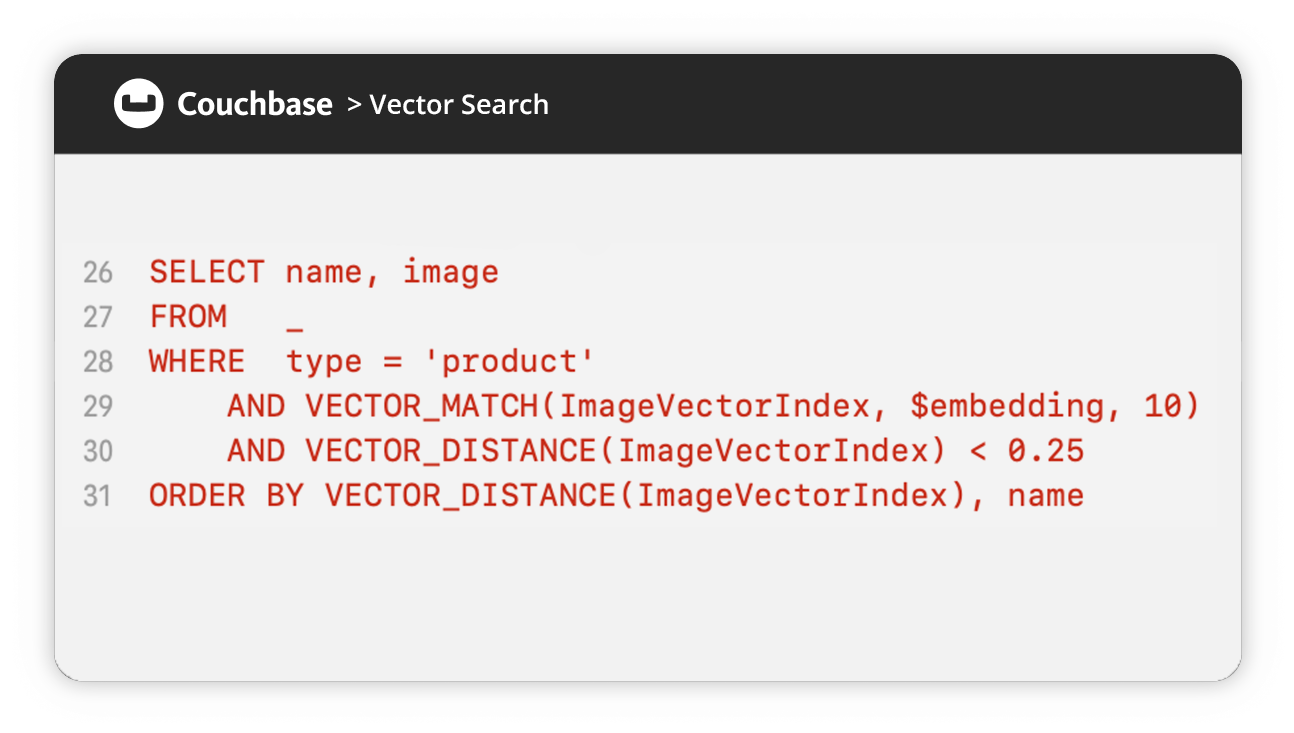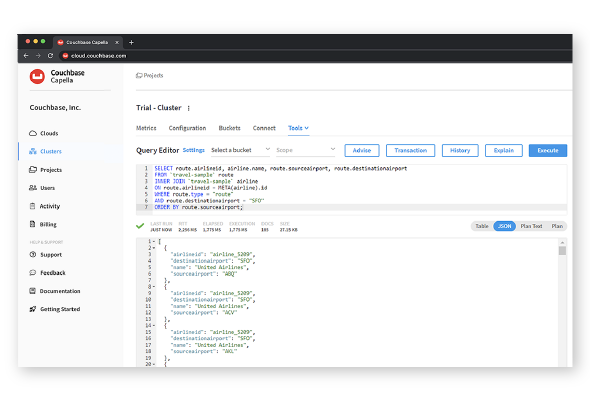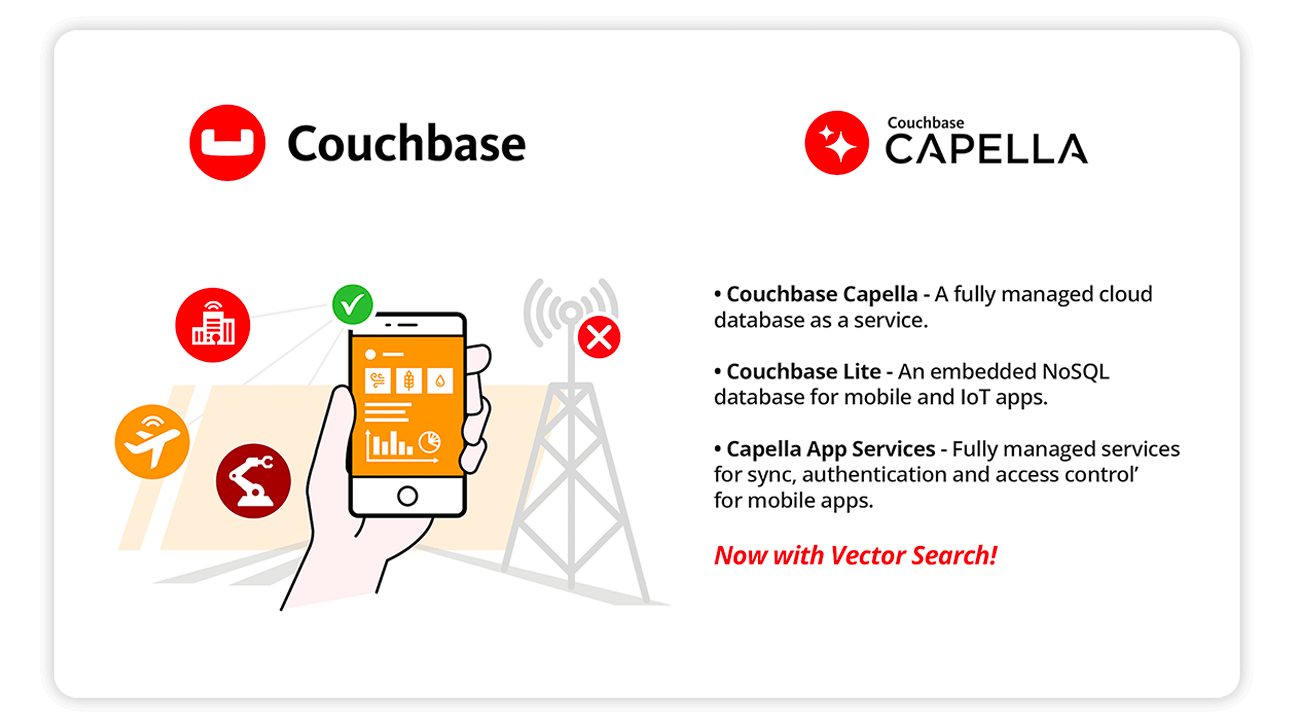Couchbase Capella™ Spring 2024: What’s New
Support for vector search and AI-powered adaptive applications
This spring release of Capella brings support for Couchbase Server 7.6, including high-performance storage, indexing, and retrieval of vector embeddings. Organizations are racing to build hyper-personalized, adaptive applications powered by generative AI that deliver exceptional experiences to their end users. Vector search enables organizations to leverage the retrieval-augmented generation (RAG) framework to interact with LLMs and other foundation models to make AI-powered applications safer, up to date, and correctly aligned to specific corporate information. Additionally, teams can use hybrid search, a combination of vector search, text search, range search, explicit value search, and geospatial search, to build out robust search solutions for end users – all within a single platform. There’s no need for adding the complexity of a separate vector database. Advanced searches can be supported by a single SQL++ query and single index to deliver powerful, yet low latency results, while at the same time lowering TCO. Learn more
Support for vectors in Couchbase Mobile
Couchbase is the first database vendor to announce vector support for its embeddable mobile database, Couchbase Lite. This will allow customers to build powerful AI-powered applications at the edge, where data is produced and consumed. See the Mobile tab for more details.
AI ecosystem integrations
Couchbase is boosting its AI partner ecosystem with LangChain and LlamaIndex to further increase developer productivity. Integration with LangChain enables a common API interface to converse with a broad library of LLMs. Similarly, Couchbase integration with LlamaIndex will provide developers with even more choices for LLMs when building adaptive applications. These integrations will accelerate query prompt assembly, improve response validation, and facilitate RAG applications.
Graph capabilities, enabled by recursive query traversals
Couchbase offers support for graph relationship traversals, which means the ability to do recursive queries for hierarchy and network mapping. Query hierarchical data structures allow for complex analyses with ANSI SQL recursive common table expressions (CTE) in areas like organization charts, bills of materials, supply chain management, network topology, and social networks, for example. Learn more
New file-based index rebalancing, reduces times by up to 80%
In order to make scale out of index nodes faster without impacting CPU or memory usage, Server 7.6 now utilizes file-based index rebalancing. Testing has shown a dramatic improvement in the time to complete rebalances, making the process easier and more successful. Learn more
Couchstore to Magma, one-step upgrade without downtime
Customers will be able to migrate from Couchstore to the Magma storage engine without stopping the front-end workloads. Customers must be on version 7.6 to enable the migration. Migration can be reversed at any time if needed. Learn more
Faster failover times, improving HA
In the case of a data node outage, the query will automatically be rerouted to the next available data node without any action from the application. The lower minimum auto-failover timeout has been reduced from 5 seconds to 1 second and the heartbeat frequency has been reduced from 1 second to 200 milliseconds. Learn more
Query simplifications
To make initial development and testing easier, users can perform all database CRUD and join operations without indexes. This improves the experience for new users with CREATE, INSERT, and SELECT without getting an index error. Additionally, users can do simple key-value range scans based on document key prefixes without needing query and indexing nodes. For the best performance, indexes are still recommended where speed is a priority. Learn more
Related resources
 Whitepapers and blogs
Whitepapers and blogs
- Announcing vector search
- Couchbase Capella™ architecture overview
- Altoros benchmark: Compare Couchbase Capella and MongoDB™ Atlas
- Couchbase Capella™ security and data protection
- Migrating from Couchbase Server to Couchbase Capella – Technical guide
- Get practical solutions to common problems: O'Reilly JavaScript Cookbook
Announcing Couchbase Enterprise Server 7.6
Support for vector search and AI-powered adaptive applications
This spring release of Capella brings support for Couchbase Server 7.6, including high-performance storage, indexing, and retrieval of vector embeddings. Organizations are racing to build hyper-personalized, adaptive applications powered by generative AI that deliver exceptional experiences to their end users. Vector search enables organizations to leverage the retrieval-augmented generation (RAG) framework to interact with LLMs and other foundation models to make AI-powered chatbots and applications safer, up to date, and correctly aligned to specific corporate information. Additionally, teams can use hybrid search, a combination of vector search, text search, range search, explicit value search and geospatial search, to build out robust search solutions for end users – all within a single platform. There’s no need for a separate vector database. Advanced searches can be supported by a single SQL query and single index to deliver powerful, yet low latency results, while at the same time lowering TCO. Learn more
Support for vectors in Couchbase Mobile
Couchbase is the first database vendor to announce vector support for its embeddable mobile database, Couchbase Lite. This will allow customers to build powerful AI-powered applications at the edge, where data is produced and consumed. See the Mobile tab for more details.
AI ecosystem integrations
Couchbase is boosting its AI partner ecosystem with LangChain and LlamaIndex to further increase developer productivity. Integration with LangChain enables a common API interface to converse with a broad library of LLMs. Similarly, Couchbase integration with LlamaIndex will provide developers with even more choices for LLMs when building adaptive applications. These integrations will accelerate query prompt assembly, improve response validation, and facilitate RAG applications.
Graph capabilities, enabled by query traversals
Couchbase offers support for graph relationship traversals, which means the ability to do recursive queries for hierarchy and network mapping. Query hierarchical data structures allow for complex analyses with ANSI SQL recursive CTE in areas like organization charts, bill of materials, supply chain management, network topology, and social networks, for example. Learn more
New index rebalancing, reduces times by up to 80%
In order to make scale out of index nodes faster without impacting CPU or memory usage, Server 7.6 now utilizes file-based rebalancing. Testing has shown a dramatic improvement in the time to complete rebalances, making the process easier and more successful. Learn more
Couchstore to Magma, one-step upgrade without downtime
Customers will be able to migrate from Couchstore to the Magma storage engine without stopping the front-end workloads. Customers must be on version 7.6 to enable the migration. Migration can be reversed at any time if needed. Learn more
Faster failover times, improving HA
In the case of a data node outage, the query will automatically be rerouted to the next available data node without any action from the application. The lower minimum auto-failover timeout has been reduced from 5 seconds to 1 second and the heartbeat frequency has been reduced from 1 second to 200 milliseconds. Learn more
Query simplifications
To make initial development and testing easier, users can perform all database CRUD and join operations without indexes. This improves the experience for new users with CREATE, INSERT, and SELECT without getting an index error. Additionally, users can do simple key-value range scans based on document key prefixes without needing query and indexing nodes. For the best performance, indexes are still recommended where speed is a priority. Learn more
Related resources
 Blogs
Blogs
 Docs and tutorials
Docs and tutorials
Announcing Vector Search in Couchbase Mobile
Vector search is now available as a beta release in Couchbase Lite, the Couchbase Mobile embedded database! For applications running on embedded and mobile devices, this exciting new capability enables semantic search, similarity search, and retrieval-augmented generation (RAG).
Running vector search in mobile and embedded devices brings all the benefits of edge computing including millisecond response times, reliability, availability even when offline, bandwidth savings and most importantly, customized responses without compromising data privacy. The benefits are amplified when combined with vector search in Couchbase Capella/Couchbase Server, enabling cloud to edge vector support.
Offline support for semantic and similarity search
Any Couchbase Lite offline-first application that uses full-text search (FTS) can be augmented with rich semantic capabilities offered by vector search, especially where simple text-based searches are insufficient to quickly retrieve contextually relevant data.
Improved data privacy for AI apps
Vector search within the device can eliminate data privacy concerns by ensuring that the personal data and search queries of sensitive nature do not have to leave the device.
Retrieval-augmented generation (RAG)
Vector search makes output from generative AI more personal by enabling retrieval-augmented generation (RAG), where current local vector data is passed along with prompts to provide better precision and context for LLM responses.
Couchbase mobile vector search beta program
Try out the new vector search capabilities in Couchbase Mobile for yourself. Sign up for beta access here


